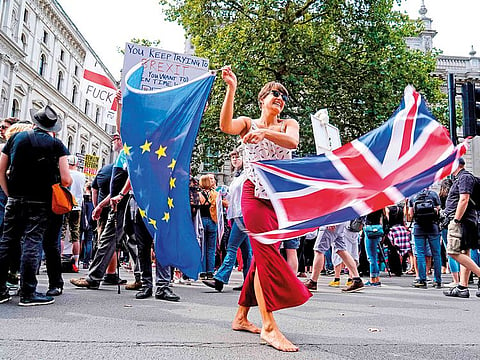What’s next for Brexit?
Here are six possible outcomes

Also In This Package
London: Prime Minister Boris Johnson’s decision to suspend Parliament has brought a wave of confusion and angry protests to Britain’s already chaotic efforts to leave the European Union.
Despite the virulent protests, the question of where Britain will end up on October 31 is still wide open. Protesters wielding pro-democracy placards and EU flags rallied over the weekend in dozens of British cities – and in the biggest demonstration, thousands of whistle-blowing, drum-banging people gathered raucously outside the gates of Downing Street in London.
The demonstrations come ahead of an intense political week in which Johnson’s opponents will go to court to block his move to suspend parliament from mid-September and legislate against leaving the European Union without an agreement. Following are six of the most likely outcomes leading up to October 31, the day when the UK is expected to leave the EU:
1 Opposition halts no-deal Brexit
Members of Parliament don’t agree about much on Brexit, but a majority oppose a “no-deal” departure and would like to rule it out of bounds. By suspending Parliament for several crucial weeks, Johnson has made this hard. But he has also galvanised his opponents into action. Jo Swinson, leader of the Liberal Democrats, hinted that they may copy Johnson in using an arcane procedure to stop a “no-deal” Brexit. So don’t count them out quite yet.
2 No-confidence against Johnson
If they fail to legislate against a no-deal Brexit, lawmakers can resort to the ultimate weapon: a motion of no confidence, ousting Johnson from office. Currently, they do not appear to have the votes to pull this off. But even if they did, it might not solve their problem. The law calls for the formation of a new government within two weeks or a general election. One option might be a caretaker administration that would request another Brexit delay to afford time to hold an election. The problem is opposition leaders cannot agree on a caretaker prime minister. Jeremy Corbyn, the natural choice as leader of the Labour Party, is too left-wing and, as a lifelong critic of the European Union, is distrusted by determined opponents of Brexit.
3 Johnson wins a snap election
If lawmakers should succeed in quickly passing legislation outlawing a no-deal Brexit before Parliament is suspended, Johnson could try to outflank them again by calling a general election. This would be risky, but he needs to hold one soon anyway because he has a working majority in Parliament of just one seat. If there is an election soon, Johnson is likely to run as a champion of the people against a Parliament intent on obstructing the pro-Brexit outcome of the 2016 referendum.
One theory is that the election could take place October 17, allowing Johnson – if he wins – to go to the European Union summit the following day with a fresh mandate. But there could be a significant roadblock. To call an election, Johnson would need the support of two-thirds of the House of Commons, so he would need opposition votes.
4 UK-EU negotiate a deal
No one seems to think this option has much chance. After all, Parliament voted three times against a Brexit agreement negotiated by Johnson’s predecessor, Theresa May, and the European Union is stubbornly refusing to reopen negotiations. But don’t rule it out. The critical date is October 17-18, when the bloc’s leaders meet, providing an opportunity for last-minute negotiations (which is practically the only way things get done there). If a potentially disastrous no-deal Brexit is still a possibility, Johnson can put a gun to the heads of European leaders to get a revised deal, then put the gun to the heads of his lawmakers to get the measure passed.
5 UK exits EU without a deal
While it is widely thought that Johnson is using the threat of an unruly exit as a negotiating tactic, it is also possible that he actually means what he says. If European leaders offer too few concessions for his liking, he might plow ahead with a no-deal exit and, given the limited parliamentary time to stop it, he might succeed. It is, after all, the default option. That would allow Johnson to unite Brexit supporters behind him in a general election either late in 2019 or in 2020.
6 Brexit runs into legal challenge
There are already three cases being considered against Johnson’s decision to suspend Parliament. Experts think these are unlikely to succeed – although Gina Miller, an anti-Brexit campaigner, defied such predictions when she won a case against May’s efforts to bypass Parliament when starting exit talks. She is trying again now.




